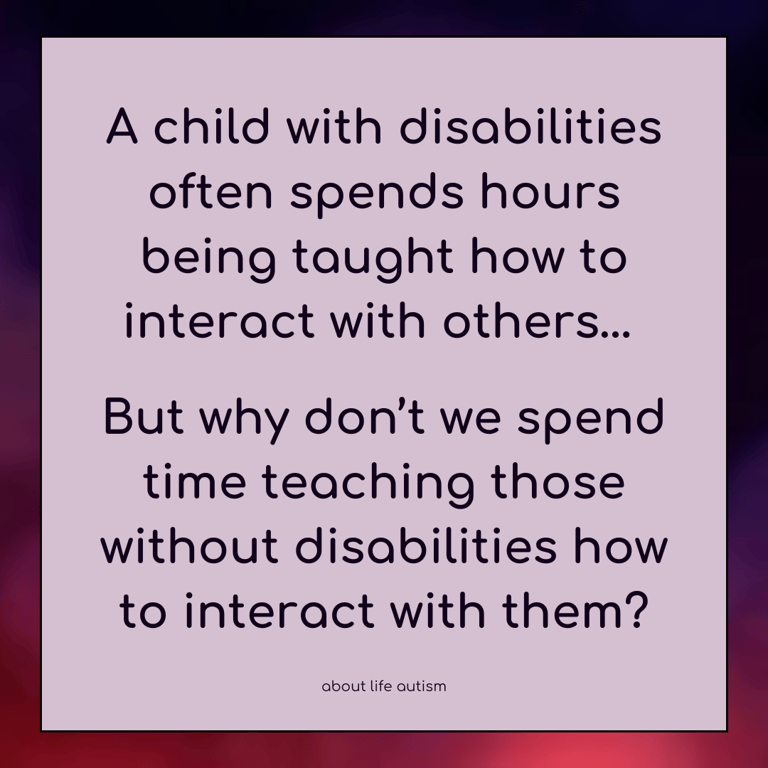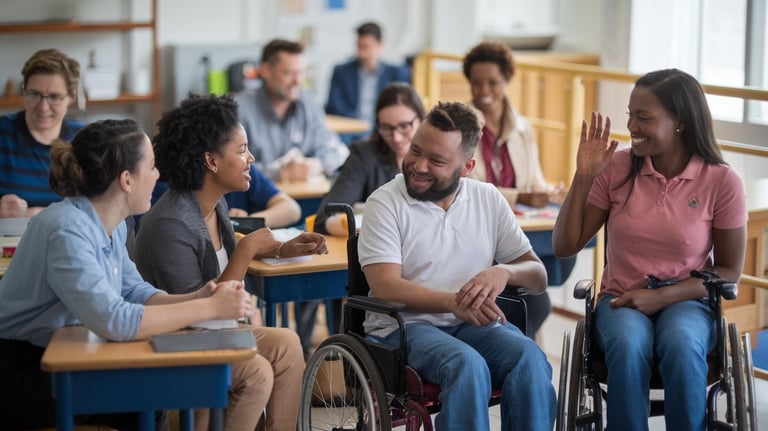The Socialisation Double Standard: Why Are We Only Training Disabled Kids?
3 min read
Disabled children are rigorously trained to conform to a society that marginalises them, while their non-disabled peers remain unchallenged and oblivious to the emotional labour involved. This systemic imbalance, rooted in capitalism’s demand for conformity and productivity, forces disabled individuals to adapt rather than making society accessible. True inclusivity requires shifting the burden - non-disabled children must be taught that differences aren’t deficiencies. They need to learn how to engage in conversations that don’t centre on their comfort, recognise and challenge ableism, and build respectful, genuine relationships. Inclusion isn’t about making disabled people more palatable; it’s about creating a just society for all.




Okay, so a child with disabilities spends hours being told how to make eye contact, how to modulate their tone, how to respond 'appropriately' to their peers - essentially, how to fit into a world that never made space for them outside of some secret section of society, building, or brain far removed from the eyes of others. Meanwhile, their nondisabled classmates, who have always walked in the sun, are free to exist as they are - untrained, unchallenged, and blissfully unaware of the nuanced emotional labour their disabled peers are constantly undertaking just to make everyone else feel comfortable. And people wonder why there has been a decline in behavioural standards in the classroom!
This discrepancy isn’t just a minor oversight; it’s systemic discrimination dressed up as inclusion. It’s the difference between integration and actual belonging.
The Socialisation Burden
From an early age, disabled children are handed an instruction manual for navigating a society that sees them as a problem to be managed rather than people to be met halfway. Social skills training, speech therapy, occupational therapy - they’re all aimed at making them appear more tolerable. But where’s the equivalent effort to make non-disabled children more tolerable to them? Who’s teaching them how to communicate with someone who types instead of speaks? Who’s coaching them on how to hold space for someone with sensory sensitivities? Who’s helping them to know that a disabled peer’s worth should not be measured by how much they can mimic 'normalcy'?
Spoiler alert: No one.
Instead, disabled children are conditioned to conform, while non-disabled children are given the unspoken permission to remain ignorant. This isn't socialisation; it's assimilation - on oppressive terms.
The Capitalist Roots of the Problem
At its core, this dynamic is deeply capitalist. Capitalism loves productivity, and productivity loves conformity. Disabled people disrupt that order simply by existing. That’s why so much effort is put into training them to be palatable rather than encouraging society to be accessible.
Schools, for example, are designed like mini-factories, churning out future workers. Disabled students are therefore seen as defective products in need of extra processing. The more they can be moulded into “functional”, “workforce-friendly” individuals, the better. But for whom? The training isn’t about their well-being - it’s about making sure they don't negatively affect the performance of others by their mere presence. Meanwhile, non-disabled kids (and subsequently adults) are left to their own social devices because their 'default' is considered correct, natural, and unquestionable - no matter the harm they might be causing everyone.
Rewriting the Social Curriculum
So what would true inclusivity look like? It would look like a world where non-disabled kids are taught from day one that different isn’t deficient. Where they learn:
How to hold conversations that don’t centre their own comfort.
How to recognise ableism in real time and challenge it.
How to engage with disabled people in ways that aren’t condescending or performative.
How to build friendships that aren’t connected to pity, but genuine connection.
This isn’t radical. It’s equitable.
Until non-disabled children are taught that accessibility is a shared responsibility, disabled children will continue to bear the entire weight of their own inclusion. And let’s be clear: that’s not inclusion. That’s pressure!
Final Thoughts
If we really want a more inclusive society, we need to stop putting all the responsibility on disabled people to bridge the gap. It’s time to train the other side, too. Because real social skills aren’t just about making other people more digestible; they’re about making society more just.
And honestly? That lesson is long overdue.


